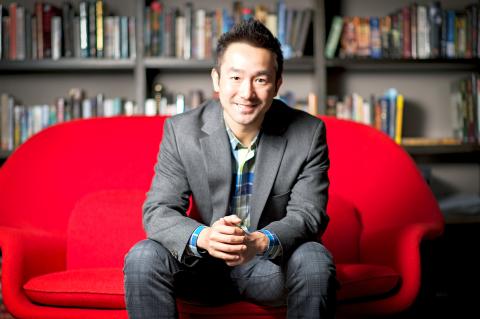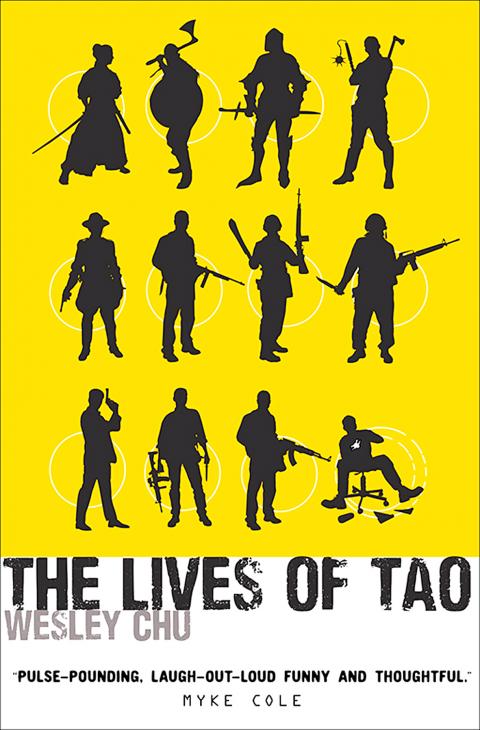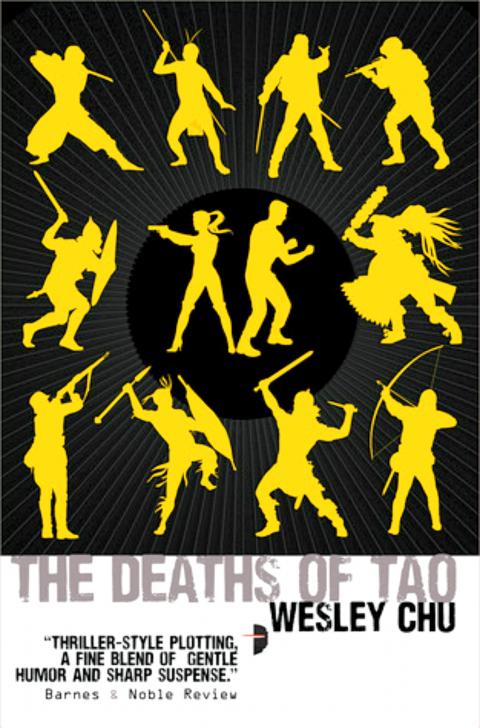It’s 11pm in Taipei but 10am in Chicago, where the award-winning author Wesley Chu (朱恆昱) is as usual in his “cave,” looking a little frayed around the edges. It’s not just the bathrobe, which has been ripped at the elbow by his dog. Handsome enough to have modeled and been cast in minor Hollywood movie roles, Chu has bed hair, a full beard and that dazed look of someone who has just woken up — or worked all night.
Framed by groaning bookshelves and sitting in his comfy chair, it would appear that the life of a science fiction writer is about letting go, being free to imagine time-bending scenarios and characters that crisscross the universe in search of derring-do. But it’s not quite that simple.
We have been emailing back and forth for weeks and after text messaging on Google Hangouts we agree to a “face-to-face” interview. If it was the 20th century, this would not be happening. In fact, it would be thought of as science fiction.

Photo courtesy of Wesley Chu
Born in mid-1970s Taipei, Chu was initially brought up in Chiayi by his grandparents because his father was studying in the US. He recalls the convenience store his grandfather owned, a chicken coop, an out-house and “biting the nose of the principal’s son because he took my toy.” At the tender age of five he joined his parents in Nebraska, but still considers himself Taiwanese, and Taiwanese-American.
Fast forward to the tail end of the 1990s and Chu had graduated from the University of Illinois with a degree in management information systems. He would go on to work as a consultant and software engineer before joining Bank of America and becoming an associate vice president.
Comfortable. Yes. Successful. Yes. But it wasn’t the life Chu wanted. In fact, he hated it. His original plan was to be a writer but his father dissuaded him, worried he would “suffer” financially as an artist. The filial son suspects that even now his father would prefer that he was working at JPMorgan rather than on fiction. Odd for an English professor to think this, you might say, but entirely in character for a “Tiger Dad.”

Photo courtesy of Wesley Chu
To get the ball rolling during our face-to-face, I point out the obvious and ask: “It really is true then that authors roll around in a bathrobe all day and essentially think great thoughts?”
“Yes, it’s fantastic. Going to work is a walk of 40 steps,” Chu says.
“Well, those 40 steps can be a challenge, I’m sure, but don’t you miss the cut and thrust of cubicle politics, the rustle of spreadsheets and the endless meetings?” I ask.

Photo courtesy of Wesley Chu
“Not one red second. It’s a different politics now, there’s publishing politics. If anything, it’s sometimes worse,” Chu says.
“You’re dealing with people who are very close to their work. In business and corporations, at least in business it’s just business. In publishing, especially for the writers, their books are like children,” he adds.
Chu is technically a SFF (science fiction and fantasy) author, and a “high concept” or “big idea” writer, meaning he comes up with plausible alternate realities, particularly those in which some kind of compelling innovation has taken place. His characters are strong and full of personality. They clash, strive and evolve according to how events play out in the novel.
His prose has a cinematic style, meaning while reading you can imagine how it would play in the movie theater. He is quite insistent that his writing style is natural rather than the result of having one eye on a big payday, saying, “It’s just the way my voice comes out.”
He’s also rather modest about his English skills, claiming his wife will divorce him if she has to do another editing job for him. Another plus is he has a globalized outlook, incorporating Asian concepts and geographical locations in his novels. His second book, The Deaths of Tao takes place in Taipei and Kaohsiung.
His literary coming out party was The Lives of Tao, which I read as having a Buddhist worldview, but Chu puts me straight on that one: “I didn’t have Asian spiritualism in mind when I was world-building the novel. I was actually more focused on writing a very personal story that reflected what I was going through at the time. The Lives of Tao, in essence, is a coming-of-age story.”
The protagonist works a dead-end job, has low self esteem and in the end finds purpose in life. While that may sound familiar, the alien that inhabits the protagonist and helps him become the person he wants to be, is of course, pure fiction. The Lives of Tao won an Alex Award and spawned a trilogy, which isn’t a bad start to a literary career.
“I’ve won a few awards,” he says. “Nothing really changes. You get a bump in sales for sure but other than that, you keep on writing. Even making the New York Times bestseller list doesn’t change your life.”
For me, his second book, Time Salvager, the first installment of another planned trilogy, is more cogent, muscular and confident. It’s set 400 years in the future and the hero is a jaundiced, addicted individual whose job is to go back in time, steal energy and not get caught. It’s strong enough to have been optioned by Paramount, with Michael Bay slated to direct.
Chu’s books have been translated into Russian, German, Hebrew and Hungarian, while Time Salvager will be published by Nautilus in Taiwan and People’s Literature in China. He says he would “love to work with Asian filmmakers on a film/television adaptation.”
Some people don’t think about the future and are not interested in books on this subject. But a grounded reality and history is also important to Chu, and it’s what makes his stories appealing.
“If you think about it, 400 years ago, we weren’t even in the steam age yet. It was horses, swords and wooden ships,” he says.
“If you bring someone from the 17th century to the present, they would probably swear we’re wielding magic. Technology advances at a curve. We’ve had more advancements in the past 50 years than in the past 500.”
As I might have intimated, Chu is really understated — from his bed hair down to the four bathrobes he wears out in a year. He claims to do nothing but write in his “cave” and occasionally get walked by his dog. He doesn’t mention his acting, modeling, nerd credentials, business and banking experience, the fact he’s a gymnast and martial artist, though he does note that “just this year, I went to Tanzania in Africa to summit Kilimanjaro.”
If the boy in Chiayi could see his future life with all the compelling innovations that have taken place, I guess it would look a bit like the science fiction/urban fantasy Chu writes.
1 OH 1, can refer to Taipei 101; an introductory course or analysis; One uh One, a spare male at a party, or a useless person — always male; there are about 1.01 men for every 1 woman, thus, every one hundred and first male is not going to find a partner-; a one-on-one interview

William Liu (劉家君) moved to Kaohsiung from Nantou to live with his boyfriend Reg Hong (洪嘉佑). “In Nantou, people do not support gay rights at all and never even talk about it. Living here made me optimistic and made me realize how much I can express myself,” Liu tells the Taipei Times. Hong and his friend Cony Hsieh (謝昀希) are both active in several LGBT groups and organizations in Kaohsiung. They were among the people behind the city’s 16th Pride event in November last year, which gathered over 35,000 people. Along with others, they clearly see Kaohsiung as the nexus of LGBT rights.

Dissident artist Ai Weiwei’s (艾未未) famous return to the People’s Republic of China (PRC) has been overshadowed by the astonishing news of the latest arrests of senior military figures for “corruption,” but it is an interesting piece of news in its own right, though more for what Ai does not understand than for what he does. Ai simply lacks the reflective understanding that the loneliness and isolation he imagines are “European” are simply the joys of life as an expat. That goes both ways: “I love Taiwan!” say many still wet-behind-the-ears expats here, not realizing what they love is being an

In the American west, “it is said, water flows upwards towards money,” wrote Marc Reisner in one of the most compelling books on public policy ever written, Cadillac Desert. As Americans failed to overcome the West’s water scarcity with hard work and private capital, the Federal government came to the rescue. As Reisner describes: “the American West quietly became the first and most durable example of the modern welfare state.” In Taiwan, the money toward which water flows upwards is the high tech industry, particularly the chip powerhouse Taiwan Semiconductor Manufacturing Co (TSMC, 台積電). Typically articles on TSMC’s water demand

Every now and then, even hardcore hikers like to sleep in, leave the heavy gear at home and just enjoy a relaxed half-day stroll in the mountains: no cold, no steep uphills, no pressure to walk a certain distance in a day. In the winter, the mild climate and lower elevations of the forests in Taiwan’s far south offer a number of easy escapes like this. A prime example is the river above Mudan Reservoir (牡丹水庫): with shallow water, gentle current, abundant wildlife and a complete lack of tourists, this walk is accessible to nearly everyone but still feels quite remote.